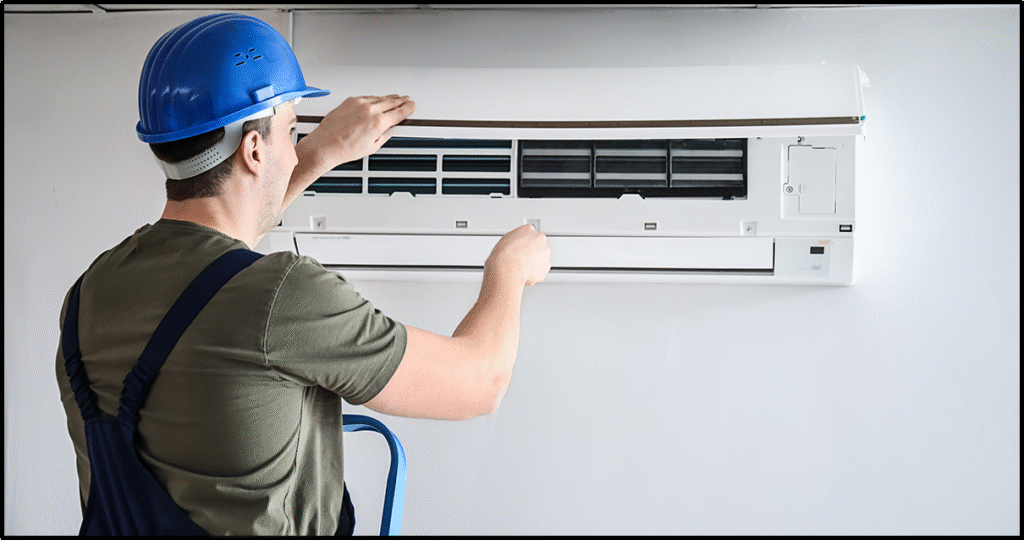
Keeping indoor spaces comfortable throughout New England’s warm, humid summers hinges on a reliable air conditioning system. For Massachusetts homeowners, scheduling an AC tune up once a year is not just a recommendation—it’s essential for preserving comfort, safety, and budget.
This guide explores the top seven advantages of regular AC maintenance service, drawing on insights from leading industry experts and local data. By the end, readers will understand how preventive care delivers energy savings, extends equipment life, and enhances indoor air quality.
Advantages of Regular AC Maintenance Service in Massachusetts
The following are the key advantages of scheduling routine AC maintenance for your home or business:
1. Reduces Energy Costs and Boosts Efficiency
A clean, well-tuned air conditioner operates with optimal heat exchange, requiring less electricity to maintain set temperatures. Massachusetts homes that receive annual AC tune-ups use up to 15% less energy on cooling compared to neglected systems.
Routine tasks—such as cleaning condenser coils, inspecting refrigerant levels, and calibrating thermostats—restore airflow, improve SEER ratings, and cut monthly utility bills by as much as 10%.
2. Prevents Costly Repairs and Extends Equipment Lifespan
Early detection of worn components or refrigerant leaks transforms small issues into manageable fixes. Technicians can tighten loose electrical connections, replace damaged belts, and clear drain lines before they lead to system failures or compressor damage.
The average tune-up investment of $100–$200 per year can avert emergency repairs often costing $350 or more, and stave off full system replacements priced between $5,000 and $10,000. This proactive approach can add years to an AC unit’s service life.
3. Enhances Indoor Air Quality and Health
Air filters, evaporator coils, and ductwork can accumulate dust, pollen, mold spores, and bacteria without regular service. During maintenance, filters are replaced or cleaned, coils are washed, and ducts are visually inspected for microbial growth.
Clean AC components reduce airborne allergens and irritants, lowering asthma and allergy triggers. According to the EPA, indoor air can be up to five times more polluted than outdoor air—making preventive AC maintenance a key step toward healthier living spaces.
4. Improves Comfort and Temperature Consistency
Uneven cooling, hot spots, and short-cycling are often symptoms of clogged filters or misaligned airflow. Comprehensive tune-ups include blower motor adjustments and refrigerant balancing to deliver consistent temperatures from room to room.
Homeowners will notice smoother temperature control, reduced run times, and elimination of abrupt on/off cycles—all of which translate to a more comfortable environment on the hottest Massachusetts days.
5. Maintains Warranty Protections
Many AC manufacturers require documented annual maintenance to honor parts and labor warranties. Skipping service could void coverage, leaving homeowners responsible for expensive component replacements.
| Maintenance Activity | Benefit |
| Coil cleaning | Restores heat transfer efficiency |
| Filter inspection/replacement | Reduces allergen circulation |
| Refrigerant level check | Prevents compressor strain |
| Electrical safety inspection | Avoids hazardous failures |
| Thermostat calibration | Ensures accurate temperature control |
6. Keeps System Running Quietly
Worn bearings, loose fans, and debris buildup create rattling, hissing, or squealing noises that signal undue stress. During an AC tune-up, technicians lubricate moving parts, secure mounts, and clear obstructions to restore whisper-quiet operation.
This attention to detail not only improves home comfort but also prevents noise-related complaints, making regular servicing essential for tranquility during long cooling seasons.
7. Delivers Reliable Performance When It Matters
Nothing spoils a summer day faster than an AC breakdown during a heatwave. Scheduled maintenance minimizes the risk of sudden failures by inspecting critical components—compressors, capacitors, contactors, and condensate drains before peak cooling demand.
With preventive care, homeowners gain peace of mind knowing the system is primed to perform on the hottest Massachusetts afternoons, avoiding emergency calls and discomfort.
| Service Tier | Inclusions | Perks |
| Basic Tune-Up | Coil rinse, filter check, refrigerant test | Priority scheduling |
| Comprehensive Maintenance | Basic + duct inspection, thermostat tune | 10% off repairs, discounted dispatch rates |
| Premium Protection Plan | All above + after-hours service | First-in-line emergency response |
Conclusion
For Massachusetts homeowners, the benefits of regular AC maintenance service extend far beyond cool air. Energy savings, fewer breakdowns, healthier indoor environments, silent operation, and warranty protection all start with an annual tune-up. By investing in preventive care, families safeguard their comfort and budget throughout every sweltering summer.
Endless Energy provides these AC maintenance services across Massachusetts, combining local expertise with unmatched customer satisfaction. Schedule a tune-up today and experience reliable cooling when it matters most.
Frequently Asked Questions
1. How often should an AC system receive professional maintenance?
Annual maintenance before the cooling season begins is recommended to catch winter wear and beat peak-season backlogs.
2. Can a homeowner perform any AC maintenance tasks?
Homeowners can replace air filters and clear surrounding debris, but coil cleaning, refrigerant checks, and electrical inspections require certified technicians.
3. What signs indicate an overdue AC tune-up?
Unusual noises, rising energy bills, inconsistent cooling, and visible refrigerant leaks all point to needed professional service.
4. How does routine maintenance affect SEER ratings?
Clean condenser coils and proper refrigerant charge help the system achieve its designed Seasonal Energy Efficiency Ratio, maximizing long-term savings.
5. Will regular AC maintenance reduce unexpected repair costs?
Yes. Preventive inspections identify minor faults early—saving money on emergency service calls and extending equipment lifespan.